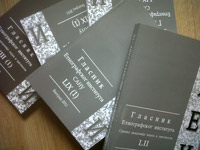Утицај очинског улагања у кћерке: случај жена у Санџаку
UDK: 392.3(497.11)"2006/2007" 316.356.2(497.11)
Сажетак
Еволуциони модел факултативних репродуктивних стратегија објашњава велики део животне историје жена, у зависности од присуства/одсуства оца и родитељског улагања. У овом раду је представљено истраживање очинског улагања и његових последица на понашање и животну историју 164 жене у регији Санџака. Као основни приступ, у истраживању се користи екологија понашања, са нарочитим освртом на женске репродуктивне стратегије. Такође, у анализу су укључени и потенцијални генетски ефекти. Екологија понашања је апликација модела еволуционе биологије у истраживању и објашњавању људских друштава. Овај приступ покушава да објасни различитости у понашању, као последицу одговора на зависност од услова средине, у напору индивидуа да максимизирају инклузивни фитнес. Спецификација фактора срединског и друштвеног окружења који ограничавају појединце да максимизирају фитнес представља можда најзначајнији чинилац. За последицу, имамо да појединци развијају стратегије понашања, дизајниране тако да реше адаптивне проблеме. Анализа је показала, после контролисања свих варијабли, да жене чији је отац био одсутан или чије је улагање било минимално имају, у просеку, ранију репродукцију, чешће побачаје и већу смртност деце, већи фертилитет, мање образовања, више бракова и партнера, више уговорених бракова, као и проблематичне и конфликтне брачне односе (укључујући и ризик од насиља у кући), у поређењу са женама код којих очинско улагање било сразмерно веће и континуирано. Когнитиво достигнуће, измерено у виду резултата теста, не утиче на родитељско улагање у овом узорку, а генетски и евокативни утицај деце нису статистички значајни. Ово истраживање сугерише да је родитељско улагање важно, само по себи, у односу на женске репродуктивне стратегије. Наравно, овакав закључак не искључује и друге факторе који могу бити једнако важни. Варијације у родитељском улагању могу бити каузална веза између врсте окружења и ризика и људских животних историја.
Кључне речи: родитељско улагање, Санџак, екологија понашања
Reference
Westport, CT: Bergin and Garvey.
Бакрачевић, С. 2007. Муфтија са две жене. Портрет без рама: Муамер
Зукорлић. Политика, 1. април 2007.
Borgerhoff Mulder, M. 1990. Kipsigis women’s preferences for wealthy men. Evidence
for female choice in mammals? Behavioral Ecology and Sociobiology,
27, 255-264.
Bumpass, L., Martin, T. and Sewwt, J. 1991. The impact of family background and
early marital factors on marital disruption. Journal of Family Issue, 12,
22-42.
Clutton-Brock, T.H. 1991. The evolution of parental care. Princeton, NJ: Princeton
university Press.
Daly, M. & Wilson, M. I. 1983. Sex, evolution, and behavior. Belmont, CA:
Wadsworth Publishing Company.
Draper, P. and Harpending, H. 1988. A sociobiological perspective on the development
of human reproductive strategies. In K.B. MacDonald (ed), Sociobiological
perspectives on human development, New York: Springer-Verlag,
pp. 340-372.
Draper, P. and Harpending, H. 1982. Father absence and reproductive strategy: an
evolutionary perspective, Journal of Anthropological Research, 38,255-
279.
Dunbar, R. I. M. 1995. The mating system of callitrichid primates. Conditions for
the coevolution of pair bonding and twinning. Animal Behavior, 50, 1057-
1070.
Ellis, B. et al. 2003. Does father absence place daughters at special risk for early
sexual activity and teenage pregnancy? Child Development, vol 74, No 3,
801-821.
Ellis, B. and Garber, J. 2000. Psychosocial antecedents of variation in girls’ pubertal
timing. Child Development 71, 485-501.
Гавриловић, Љ. 1985. Додељивање деце после развода брака као показатељ
положаја жене у друштву. Етнолошке свеске VI, 11-17.
Geary, D. 2000. Evolution and Proximate Expression of Human paternal Investment.
Psychological Bulletin, vol. 126, No 1, 55-77.
Hames, R. 1992. Variation in paternal care among the Yanomamo. In B.S. Hewlett
(Ed), Father-child relations: Cultural and biological contexts. New York:
Aldine de Gruyter, pp. 85-110.
Hewlett, B. S. 1988. Sexual selection and paternal investment among Aka pygmies.
In L.Betzig, M. Borgerhoff Mulder and P. Turke (eds.), Human reproductive
behavior: A Darwinian perspective. Cambridge, England: Cambridge
University Press, pp. 263-276.
Hogan, D. P. and Kitagawa, E. M. 1985. The impact of social status, family structure
and neighborhood on the fertility of black adolescence. American
Journal of Sociology, 90, 825-855.
Irons, W. 1993. Monogamy, contraception and the cultural and reproductive success
hypothesis. Behavioral and Brain Sciences, 16, 295-296.
Kaplan, H. Lancaster, J. B. and Anderson, K.G. 1988. Human parental investment
and fertility. The life histories of men in Albuquerque. In A. Booth and A.
C. Crouter (Eds.), Men in families: when do they get involved? What difference
does it make? Mahwah, NJ: Erlbaum, pp. 55-109.
Keith, V. and Finlay, B. 1988. The impact of parental divorce on children’s educational
attainment. Journal of Marriage and family, 50, 797-809.
Lancaster, J. B. 1985. Evolutionary Perspectives on Sex Differences in the Higher
Primates. Gender and the Life Course. Ed. A.S. Rossi. New York: Aldine,
pp.3-28.
MacDonald, K. 1995. The establishment and maintenance of socially imposed
monoigamy in Western Europe. Politics and Life Sciences, 14, 3-46.
Мушовић, Е. 1985. Тутин и околина. Гласник Етнографског института XXVII,
САНУ, Београд.
Patrke, R. D and Buriel, R. 1998. Socialization in the family: Ethnic and ecological
perspectives. In W. Damon and E. Eisenberg (Eds.), Handbook of children
psychology, New York: Wiley, pp. 463-552.
Quinlan, R. J. 2003. Father absence, parental care, and female reproductive development.
Evolution and Human Behavior 24, 376-390.
Reiss, D. 1995. Genetic influences on family systems: Implications for development.
Journal of marriage and the family, 57, 543-560.
Thornhill, R. 1976. Sexual selection and paternal investment in insects. American
naturalist, 110, 153-163.
Trivers, R. 1972. Parental Investment and Sexual election. In Sexual Selection and
the Descent of Man: 1871-1971. ed. B. Campbell. Chicago: Aldine Publishing
Company, pp. 136-179.
van den Berghe, P. L. 1979. Human Family Systems: an Evolutionary View. New
York, Oxford: Elsevier.
Vandamme, T. H. P. and Schwartz, S. 1985. Father absence and scholastic performance
in primary school children, Current psychology, vol 4, no 3, 204-
213.
Whiting, B. B. and Whiting, J.W.M. 1975. Children of six cultures: A psychocultural
analysis. Cambridge, MA: Harvard University Press.
Williams, G. C. 1966. Adaptation and natural selection: A critique of some current
evolutionary thought. Princeton, NJ: Princeton university Press.
<https://www.ei.sanu.ac.rs/index.php/gei/article/view/565>.
Датум приступа: 23 apr. 2024






